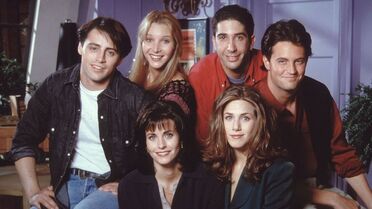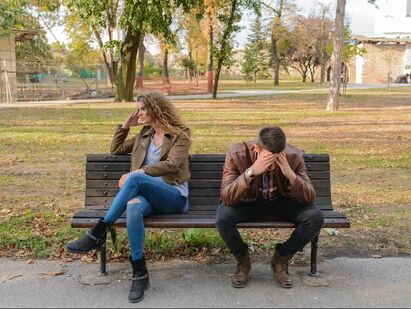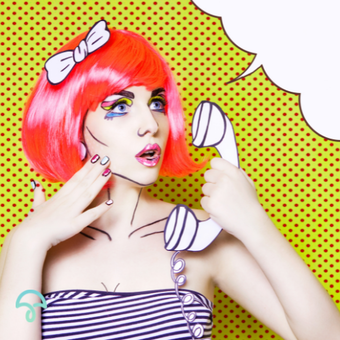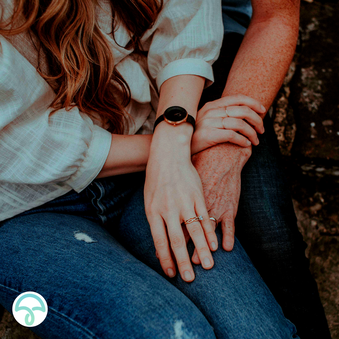How to Leave a Toxic Relationship: 6 Practical Tips Leaving a toxic relationship is one of the hardest things many people face. It is not just the act of breaking up, which most of us have experienced at some point, but the profound impact a toxic relationship has on you. This impact can make it feel almost impossible to break free, leaving you feeling undeserving of love and respect. But the fact that you are reading this article is a significant first step towards reclaiming your life. In this guide, we will explore practical, emotional, and psychological steps to leave a toxic relationship and find closure.
0 Comments
The Psychology of Friends: 6 Lessons About Relationships We all remember the famous dispute between Ross and Rachel from FRIENDS, passionately arguing over whether they were on a break or not. But beyond the comedic banter, these instances offer a glimpse into the intricate psychological landscapes of the characters. What lies beneath the surface? What do the storylines of the show reveal about the characters' mental lives and their complex relationship dynamics? Join us as we embark on a fascinating exploration, uncovering the psychological depths of the FRIENDS characters and gaining insights into their relationship issues and personal journeys. The 5 Core Emotional Needs of Every Relationship Relationships can be challenging, and even the strongest and healthiest relationships can hit bumps in the road. But what if there was a framework to understand the core emotional needs that underpin all relationships? Understanding these needs can help us build strong and fulfilling relationships, while neglecting them can lead to dissatisfaction and even the breakdown of a relationship. Emotionally Focused Therapy (EFT) is one such framework that emphasizes the importance of meeting five core emotional needs in relationships: having a secure attachment, having fun, having boundaries, having autonomy, and having open communication. In this blog post, we will explore each of these emotional needs in more detail and how they can impact our relationships. How To Build Meaningful Connections with Others In today's world, where technology and social media dominate our interactions, it is easy to feel disconnected from those around us. However, research shows that building and maintaining strong connections with others is essential for our well-being and happiness. In this article, we will explore the many benefits of connection and how we can foster meaningful relationships in our lives. 6 Green Flags of Healthy Relationships According to a Therapist Are you looking for signs that you and your partner are on the right track? Whether you are starting a new relationship or have been together for years, it is important to know what a healthy relationship looks like. In this article, we are going to explore six green flags that are positive indicators that your relationship is on the right track. These green flags are based on patterns that I have observed in my clinical practice, so you can trust that they are tried and true. So, let's dive in and discover the signs of a healthy and fulfilling relationship! How to Get Over your Ex and Breakup According to a Therapist Everybody has gone through a breakup in their lives. Breakups are usually very painful. They can be profoundly hurtful emotional experiences, and sometimes we are not equipped with the right tools or knowledge in order to deal with such an experience. Sometimes we do not know what to do, and are trapped in an emotional rollercoaster. We might be going from one side to the other; from loving and being nostalgic about our (ex)partner, to hating our (ex)partner. Breakups are a transition, a journey in our lives where we might start to foster more self-love, self acceptance, and figure out what are the things that are important to ourselves. It is a moment of reflection where we can ask ourselves what is the type of relationships we want to have from here onwards. What is the person that we would like to be? In this article, I will help you navigate through the emotional turmoil that ensues after a breakup; we will discuss how can we better cope after a breakup. Disorganized Attachment Style in Relationships: 2 Dating Tips Have you been in a relationship where your partner worships and loves you one day, and, on the next day, they act distant, aloof, and cold towards you? Have you been in a relationship where there is a lot of back-and-forths and ups-and-downs? A relationship that does not feel stable and where you do not know what to expect from your partner. On one day, they are very close to you and on the other day, they are very far away from you; emotionally and mentally. In psychology, people that act like this in relationships are said to have a Disorganized Attachment Style. In this article, we are going to learn more about this attachment style, but, most importantly, we will learn how to communicate with a partner with this sort of style, and how to foster a healthier and more secure relationship. How To Apologize The Right Way: Best Examples and Tips It is only human to make mistakes. We all commit errors, let other people down, and break promises. While we all commit mistakes, not everybody is adept at asking for forgiveness. Not everyone has been taught how to apologize in a way that is effective, sincere, and heartfelt. That is why today we will share with you the key ingredients for delivering a good apology. What is Gaslighting in Psychology? 10+ Signs and Examples "No. I never said that." "See, I told you it was all in your head." "What are you even talking about?" "You are too emotional." Have you ever been told these phrases and made to question your own perception of reality? Then chances are that you have been gaslighted. But, what does gaslighting means, how does it look like, and what can I do if I am being gaslighted? In this article we will answer these questions and share the steps you can take if you are being gaslighted. How To Move On After Being Cheated On: 20+ Tips Being cheated on is a big betrayal of one’s trust. It’s not easy. It’s painful. Regardless of the duration or the type of affair, it is normal to feel betrayed, angry, sad and at a loss. Being cheated on can have you start questioning your personality, beliefs and views of the world. It can also bring up fears of being alone, and trigger anxious feelings of having to meet new people or to reestablish a healthy relationship with your partner again. Finding out that you have been cheated on while still in the relationship is testing. It leaves a big question behind: whether to stay with your partner or whether to go. 8 Ways to Become Less Codependent in Your Relationship We are hardwired for connection. Connection to others is a fundamental need we all have. It’s important to us to connect with others. This is especially true in romantic relationships. A relationship without connection makes it almost impossible to be intimate and have deep, meaningful conversations with one another. However, sometimes we might rely excessively in our partner and, in the process, lose ourselves in our relationship. This is often a sign of codependence in relationships. Today we will discuss what codependence is, the signs of codependency in relationships, and how to move from a place of codependency to healthy interdependency with your partner. How To Date Someone with an Avoidant Attachment: 14 Tips We all have different patterns of behavior when it comes to dating and romantic lives. How we act in our relationships largely depends on our past experiences, or what psychologists like to call: our attachment style. Some people have secure attachments, while others might have developed insecure attachments. It can sometimes be challenging to support a partner with an insecure attachment style. That is why today we will discuss how it is to date a person with an insecure, avoidant style, and share how to better support them in order to foster a loving, fulfilling, and healthy relationship. Anxious Attachment in Relationships: 7 Ways To Support Your Partner Are they ignoring me?” “Did I say something that made them not respond to my text immediately?” “They’re going to break up with me…” “I am leaving the room. It’s clear they don’t care about me.” These are the kind of thoughts that can go through the mind of an anxiously attached individual. Before we get deeper into what it means to have anxious attachment, let’s have a look at what an attachment style is… What NOT To Do After a Breakup or Divorce: 7 Helpful Tips Human beings love routines. We prefer a safe and known environment, such as the city that we have been living in for years or the long term relationships that we have for years. These routines include not only daily life activities but also the people we chat, hang out, and spend most time with. Therefore you can imagine how challenging it is when we go through big life changes such as breaking up or having a divorce. Whether you want it or not, breaking up with a person you loved can turn your world upside down and cause so many different emotions in a short span of time. A breakup or divorce is not just a process of two people splitting up, but also a process of loss and grief. You lost your hopes or plans for the future and the commitments or promises that you made with that person. Because of this flood of emotions, it's normal if you might feel like acting on your anger or other overwhelming emotions. And that's why we are here: to suggest alternative and healthier options. 11 Ways to Support a Partner with High-Functioning Depression It's common to feel confused, lonely, or hurt when you watch someone you love go through a hard time. Even more so, it is natural to feel a sense of concern for a loved one who is experiencing symptoms of depression and to wonder what the best way to support them is. You’re not alone in this process. According to the Anxiety and Depression Association of America (ADAA), in the United States, in 2017, 17.3 million adults over the age of 18 lived with depression. In addition, Persistent Depressive Disorder (PDD) affects approximately 1.5 percent of the U.S. population in a given year (about 3.3 million American adults). Lost Yourself in a Relationship? 5 Tips to Find Yourself Again Relationships can be exciting. Comforting. Supportive. Help you grow as an individual. They can be a great space for self-discovery and self-development. However, for one reason or another, instead of flourishing as an individual, you might catch yourself consumed by the relationship to the point that you cannot recognise yourself anymore. You end up spending every possible moment with your significant other and sacrifice things you used to enjoy, for the sake of activities with your partner. Because you have been putting so much focus on the needs and wishes of your partner and the relationship, you have forgotten about what you want, what makes you happy and what you want to achieve in life. 10 Red Flags in Relationships - A Couples Therapist Explains We don’t know anything about relationships until the moment we enter them. That’s the point when we start figuring out that there is a big difference between “love” as an abstract concept and “love” as a conscious, proactive, mindful decision. Unfortunately, sometimes we learn all those lessons about relationships through the hard way: we break up, we get rejected, we get abandoned, we get betrayed, we get traumatised, we get hurt, we get divorced, we lose ourselves in the relationships. But how can we know whether a relationship is a “thumbs-up” or a “no-go”?  Have you ever met someone who presented themselves as a highly empathetic person but the more you got to know them, you realized this was only a facade, more like a mask and in reality their intentions and actions were self-serving? Let me introduce you to the covert narcissist. If you know about narcissism, you probably already know that narcissists are notorious for their sense of entitlement, their extreme need for approval, and this feeling of grandiosity around them. At the same time, they show little empathy for others. The covert narcissist has all these elements and traits, but, at the same time, they hide it very well. They play with humility, and they are, of course, very sensitive to what other people think of them.  "Don't leave when I'm talking to you!" "This is so much pressure, I miss being single..." "I'm afraid you don't care for me as you used to..." "I need some space! You're suffocating me!" These are some typical phrases of partners of insecure attachment styles and they show not only how they view their partner but also how they are trying to protect themselves in the relationship. Have you heard of the term "attachment style" before? Do you have a dismissive, preoccupied, fearful-avoidant or a secure attachment style? If you do not know what this is all about, then this article is just for you. Here we will explore attachment theory, discuss the different attachment styles and what each one of them means in adult relationships.  Have you ever met a person that was afraid of commitment? Or, perhaps you are a person that is scared of committing to your loved one. Maybe you constantly ask yourself if you are with the wrong person and find yourself pulling away any time there is intimacy. If you or someone you know is struggling with commitment phobia, then this article is for you. How to overcome perfectionism in your relationship: 5 waysWhat is Perfectionism in Psychology You have probably heard about perfectionism and its most common traits: attention to detail, strive for perfection, unrelenting standards, wanting to be prepared for all cases, struggling to make decisions, fear of failure, intolerance for mistakes, confused priorities, and generally the feeling that one can never rest because what one has done so far is not enough. You probably think that this applies only to work or work-related tasks: where you are trying to be a better employee, a better manager, or a better student. However, if you have a perfectionist mindset, it’s hard to leave your personal life out of it. Consequently, your relationships may be affected by this mentality and, unfortunately, they will stop being as fun as they used to be, if perfectionism prevails in them. How to heal after a break up or divorce Relationships are challenging. We cannot control them. We cannot guarantee that they’ll succeed. In fact, when you come to think about it, what we know about relationships is… not much. Unfortunately relationships are not part of any school curriculum. For most of us, the only “blueprint” we have about relationships is that of our parents — and many times, it’s not an example we can (or should) replicate. So when we’re faced with one of the toughest moments in a relationship, a breakup, most of us not only are overwhelmed by the pain and sense of loss that follows it, but we also lack the tools to process this trauma and start our path towards healing. If you’re going through a breakup, I’m sorry. I hope that you’ll find solace in these steps below. Why is it so hard to leave a toxic relationship? It is often the case that after we get out of a relationship, we look back and we see all the things we couldn’t see when we were in the relationship: the pain, the rejection, the lack of respect and boundaries. But if it’s so painful, why isn’t it easier for us to see clearly what is best for us and leave a toxic relationship sooner rather than later? Are you a pursuer or a withdrawer in your relationship? When fighting with your partner, do you prefer to: A - Ask for explanations, blame, push, overanalyse, criticise or B - Retreat, shut down, walk away, avoid or find distraction? If A, you are probably a pursuer. And I say “probably” because there is another type of pursuer, I will explain later. If B, then you are probably a withdrawer. Why We Push The People We Love Away & How To Stop ItThe Strange Case of Dr Jekyll and Mr Hyde Are you familiar with the story of Dr. Jekyll and Mr Hyde? It’s based on the novella of Robert Louis Stevenson and the story is about a man who he is a respectful and kind doctor during the day, when the night falls he turns into a heartless evil, killing innocent people. What Stevenson is trying to describe here is the duality of human nature; in other words how the shifting between “good” and “bad” is part of our inner struggles and how hard it is to incorporate both in order to come in peace and in acceptance of the inevitable existence of both these elements in our lives. |
Therapy |
|
